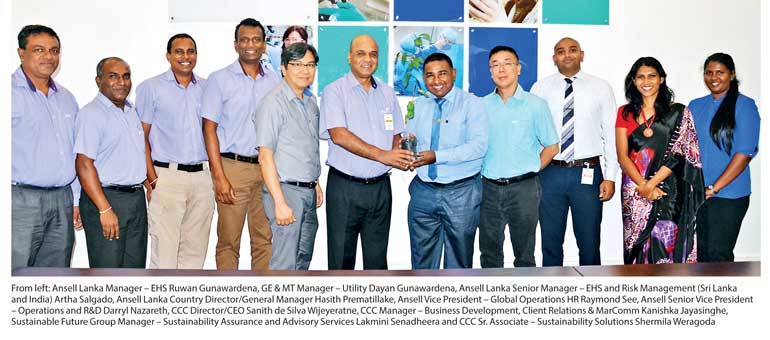Saturday Feb 21, 2026
Saturday Feb 21, 2026
Wednesday, 8 November 2017 00:00 - - {{hitsCtrl.values.hits}}
 Ansell, a global leader in protection solutions and the largest manufacturer of personal protective equipment in Sri Lanka, recently marked a major milestone in sustainable manufacturing and environmental stewardship. Partnering with The Carbon Consulting Company (CCC), Sri Lanka’s foremost provider of integrated sustainability solutions, Ansell recently launched an agroforestry project to create a biodiversity corridor connecting Haycock and Dunawala, two separate and protected rainforests in the southern region of the island.
Ansell, a global leader in protection solutions and the largest manufacturer of personal protective equipment in Sri Lanka, recently marked a major milestone in sustainable manufacturing and environmental stewardship. Partnering with The Carbon Consulting Company (CCC), Sri Lanka’s foremost provider of integrated sustainability solutions, Ansell recently launched an agroforestry project to create a biodiversity corridor connecting Haycock and Dunawala, two separate and protected rainforests in the southern region of the island.
The ‘Ansell Bio-Link’, as the project is called, will be validated and certified under ISO 14064-2 and will become Sri Lanka’s first forestry project to be certified under this standard and also the country’s first carbon insetting project. Carbon insetting, an innovative carbon emissions reduction methodology, is gaining awareness especially among European brands such as Chanel, Nespresso and L’Oréal which have embarked on major carbon insetting projects at global locations within their supply chains.
“On behalf of the 4,500 Ansell employees and their families living in Sri Lanka and our stakeholders worldwide, we are proud to support the creation of the Ansell Bio-Link,” said Darryl Nazareth, Senior Vice President, Global Operations and R&D, who signed the agreement with CCC on behalf of Ansell. “Ansell continues to work towards reducing its environmental impact through climate efficiency, identified as one of the key Sustainable Development Goals established by the United Nations.”
Two thousand trees will be planted during the first year of the project and 1,000 trees each year afterwards, for a minimum of five years. The species of trees planted within the Ansell Bio-Link will be predominantly native and endemic rainforest trees.
To mark the signing agreement, a ceremonial planting of ‘Indian Beech’ saplings took place at the Ansell Biyagama plant premises as well as at one of the selected project sites.
CCC CEO Sanith de S. Wijeyeratne remarked, “The devastating floods that many Sri Lankans had to face only a few months ago, and the severe droughts that many parts of the country are currently experiencing, serve as dire warnings of the dangers of Climate Change through causes such as deforestation. The accelerated rate of deforestation has to be curtailed at all costs. This is where companies can come in to fulfil one aspect of their corporate environmental responsibility. We are encouraged that a global protection company such as Ansell has chosen to focus their efforts here in Sri Lanka and are proud to partner with them in this great initiative.”
Unlike traditional carbon offsetting, carbon insetting takes a holistic approach, addressing both environmental and social challenges, including poverty in rural communities. This particular project involves local smallholder farmers who will be compensated to plant and maintain the trees within the Ansell Bio-Link. To generate extra income for the project participants, 25 percent of the trees planted will constitute ‘non-timber forest products’ (NTFP) as well.
Additionally, CCC will coordinate training for the farmers on additional income generation related to agroforestry, such as organic farming, beekeeping, composting, plant budding and nursery management, and support the creation of a Community Based Organisation to enable the farmers to sell their NTFP. Through this project, CCC estimates that the average income of farmers in the Ansell Bio-Link area will increase by 10 to 15% annually.
In addition to reforestation, the Ansell Bio-Link will support additional positive benefits to the rainforest ecosystem, including improved soil, water and air quality, the prevention of soil erosion, and watershed protection.
“Ansell is investing in this initiative because it sees carbon insetting as a smart environmental choice,” concluded Darryl Nazareth. “The trees will offset manufacturing emissions and add to the preservation of natural resources in Sri Lanka, and at the same time help farmers with better land, ecosystems, and revenues.”